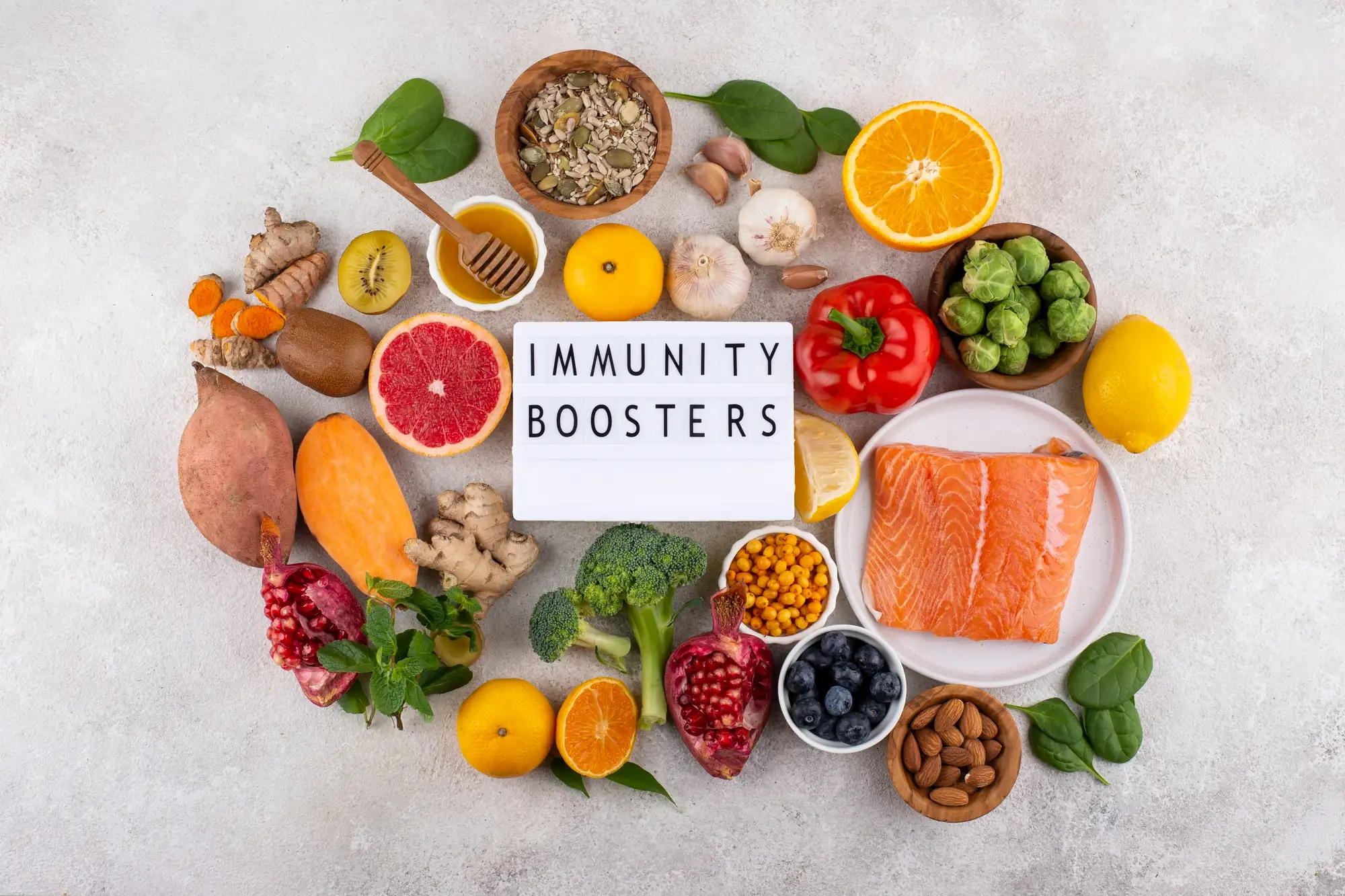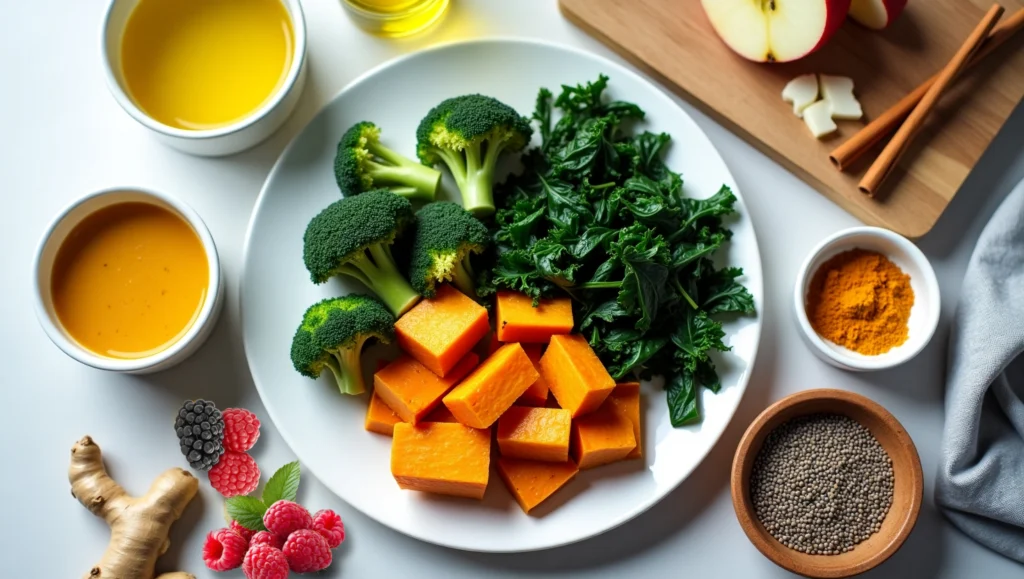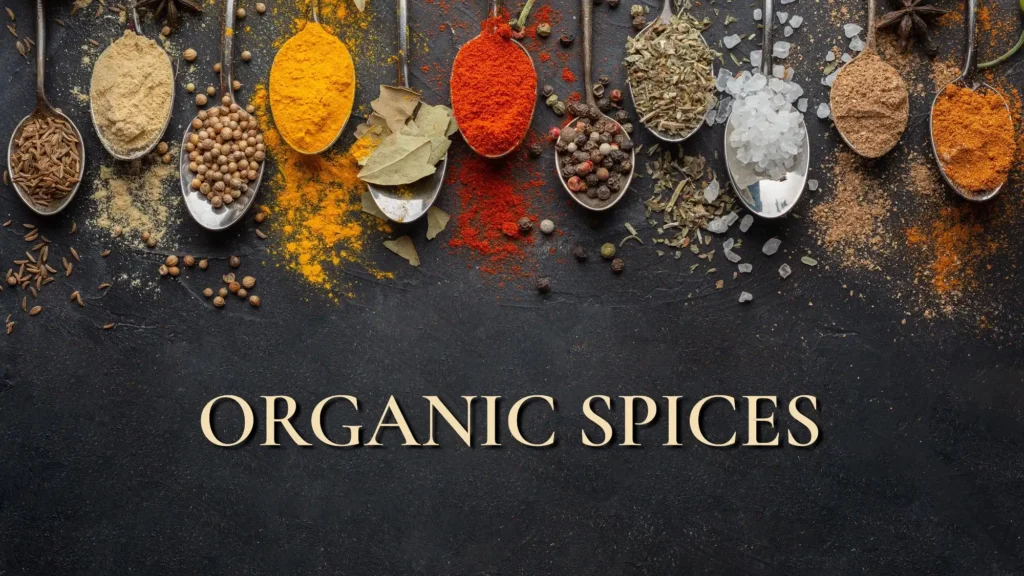Looking for real immune boosting foods that work? It starts with what’s already on your plate. Starting with food is one of the simplest ways to build a stronger immune system.
There are supplements, tonics, and miracle shots on every shelf — but your body still runs on what you eat daily. And that’s where real immune strength begins. No trendy powder can replace the power of a fresh, whole meal.
This list isn’t about superfood hype. It’s about clean, everyday foods backed by research and loaded with nutrients that support your body’s natural defenses.
Why Focus on Immune-Boosting Foods?
Your immune system is like your body’s security team. It works around the clock to identify and fight off threats — viruses, bacteria, toxins.
To do that well, it needs fuel. And that fuel comes from nutrients like:
- Vitamin C for making white blood cells
- Zinc and Iron for cell repair and pathogen defense
- Probiotics for gut balance (which impacts over 70% of immune activity)
- Antioxidants that fight inflammation and cellular damage
That’s why what you eat regularly matters more than any last-minute flu shot smoothie.
The Top 20 Immune-Boosting Foods You Can Trust
These foods are grouped based on what they bring to the table — antioxidants, minerals, gut health support, and more. You don’t need all 20 every day. Just aim to work a few into your week and rotate with the seasons.
Immune-Boosting Foods #1–5: Vitamin C Powerhouses
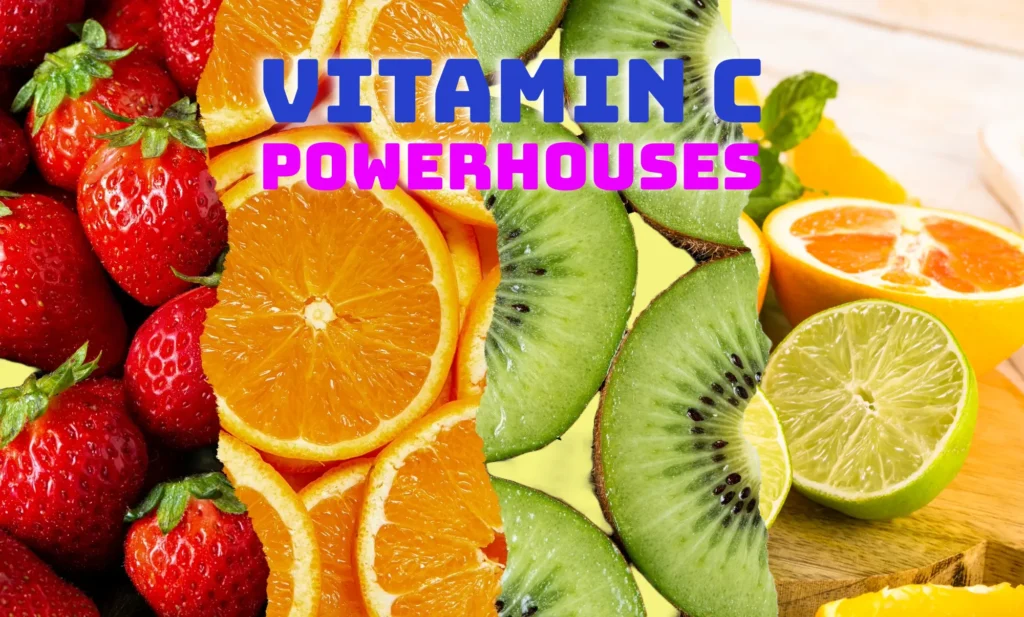
These aren’t just cold-season classics — they help your body build a stronger immune response year-round.
- Oranges – Easy, affordable, packed with vitamin C
- Red bell peppers – Twice the vitamin C of oranges, plus beta-carotene
- Strawberries – Delicious and rich in antioxidants
- Kiwi – Small fruit, huge vitamin punch
- Broccoli – High in C, A, and fiber — especially when steamed lightly
Vitamin C doesn’t just help with colds — it’s essential for the growth and repair of tissues throughout the body. Oranges and kiwis get a lot of love, but red bell peppers are surprisingly powerful here. They’re rich in both vitamin C and beta-carotene, which work together to fight inflammation and strengthen immune cells. According to the Cleveland Clinic, eating a diet rich in vitamin C may help shorten the duration of respiratory infections. Try slicing peppers raw for a snack, or roasting them for a sweeter, milder flavor.
Top Immune Foods #6–10: Fermented Gut Health Heroes
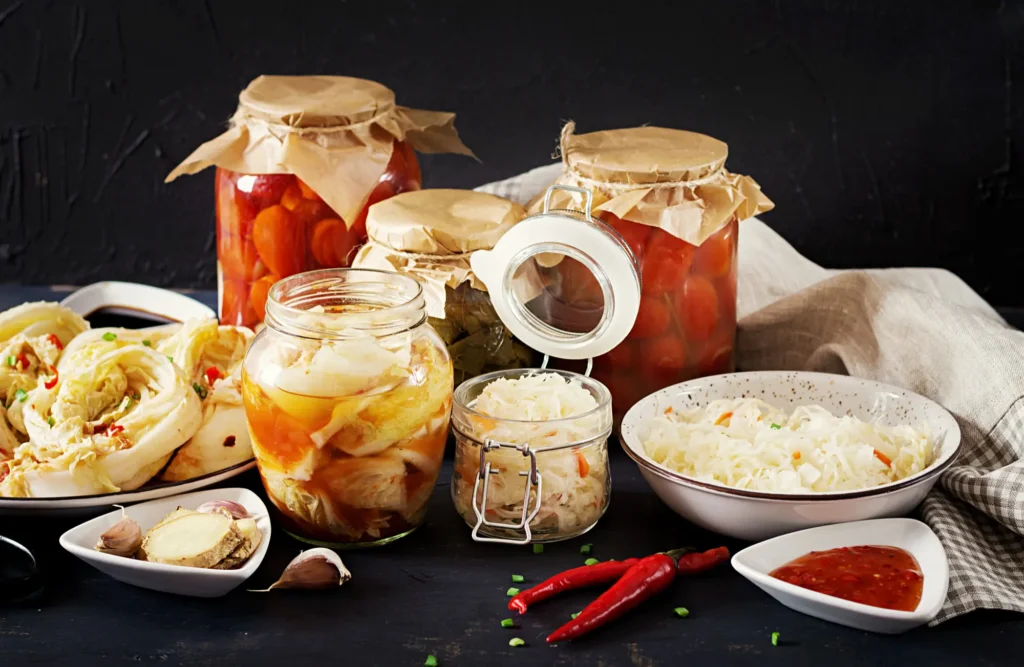
Your gut is home to trillions of microbes. The better their balance, the better your immune system works.
- Yogurt (plain, organic) – Natural probiotics that feed gut health
- Kefir – Fermented dairy with up to 30 strains of beneficial bacteria
- Sauerkraut – Fermented cabbage that adds both crunch and microbes
- Miso – Fermented soybean paste used in soups or broths
- Kimchi – Spicy Korean side loaded with probiotics and antioxidants
Here’s something wild: more than 70% of your immune system lives in your gut. So yeah, the yogurt you’re eating actually does more than taste good. Fermented foods like kefir and kimchi deliver helpful bacteria that support immune balance. Harvard Health explains that adding probiotics from fermented foods and immunity might even reduce infection risk over time. It’s not a gimmick — it’s gut science.
When I started adding more probiotic foods, I also looked for warm, soothing ways to calm inflammation. That’s when I found this Organic Turmeric Ginger Tea Recipe. The combo of turmeric and ginger isn’t just comforting—it works with your gut and your immune system in sync.
Immune-Boosters #11–15: Anti-Inflammatory Superfoods
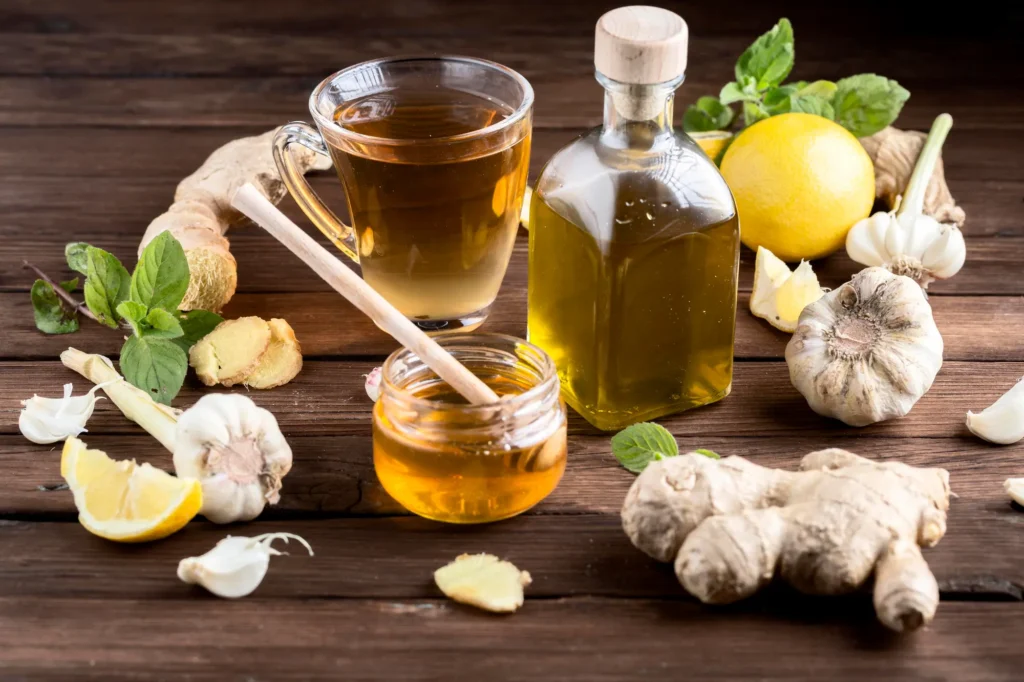
Chronic inflammation weakens your immune response. These foods help calm it down and restore balance.
- Garlic – Contains allicin, shown to enhance immune cell response
- Ginger – Soothes inflammation and may reduce oxidative stress
- Turmeric – High in curcumin, known for anti-inflammatory effects
- Green tea – Loaded with catechins, especially EGCG
- Blueberries – Packed with antioxidants and anthocyanins
These immune boosting foods work especially well when used together — supporting the body’s natural defenses without artificial help. Turmeric gets most of the spotlight, but garlic is just as worthy. Its active compound, allicin, has been shown to improve immune function and even reduce the frequency of common colds. A review published by the NIH shows that curcumin, the key compound in turmeric, may help modulate immune activity and support better response to stressors. Just a small amount added to soups, teas, or dressings can go a long way.
Want something refreshing that packs in antioxidants and supports immunity? Try our Organic Berry Smoothie Bowl. It’s a quick breakfast or post-workout meal featuring immune-loving ingredients like strawberries and blueberries.
Foods #16–20: High-Zinc & Iron Picks for Immunity
Zinc is crucial for creating immune cells. Iron helps them carry oxygen where it’s needed. Both matter.
- Pumpkin seeds – One of the best plant sources of zinc
- Chickpeas – Offer both zinc and fiber
- Lentils – Rich in plant-based iron, especially when paired with vitamin C
- Spinach – High in both iron and folate
- Lean red meat – Organic options offer highly absorbable heme iron
Pumpkin seeds aren’t just for trail mix. Just a tablespoon gives you a good chunk of your daily zinc needs — and that’s important, because zinc helps activate your immune system’s “fighter cells.” A breakdown from the NIH Office of Dietary Supplements confirms this. I like sprinkling some on salads or adding them into oatmeal for an easy boost.
Or if you want a nutrient-dense traditional remedy that combines zinc, iron, and warming spices in one energizing mix, this warming blend for daily strength has been used for generations to support seasonal immunity and strength.
If you’re already eating quinoa or avocado, there’s an easy way to make it count. I throw them together into this salad. Nothing fancy — just mix, season, done. It’s clean, high in iron and zinc, and actually something you’ll want again.
How to Build a Daily Immune-Boosting Plate
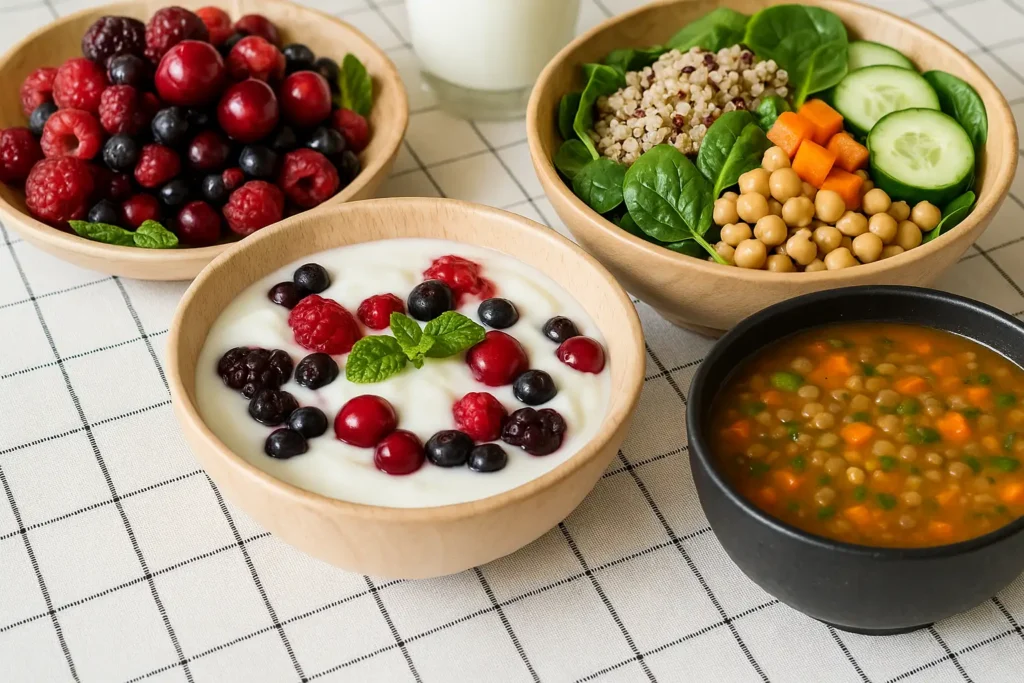
You don’t need to memorize food labels or track every nutrient. Just follow this pattern:
- Pick one bright-colored fruit or veg
- Add one fermented food or healthy fat
- Include a mineral-rich seed, legume, or grain
Sample Day:
- Breakfast: Yogurt with strawberries + pumpkin seeds
- Lunch: Quinoa + spinach salad with citrus vinaigrette
- Snack: Green tea + a few blueberries
- Dinner: Lentil curry with turmeric and garlic
Need help stocking your fridge or freezer with clean, immune-friendly meals? This Homemade Baby Food Prep Guide walks through how to batch-prep purees and smoothies using several of the foods listed here.
What to Limit If You Want Better Immunity
Even a great diet can be dragged down by what’s missing — or what’s working against you.
❌ Ultra-processed foods – High in refined sugar, low in nutrients
❌ Sugary drinks – Disrupt blood sugar + gut health
❌ Low-fiber foods – Starve your beneficial gut bacteria
❌ Alcohol – Depletes key immune-supporting nutrients
Some foods just quietly work against you — even the ones that don’t look like junk at first glance. I remember grabbing a “healthy” granola bar thinking it was a smart snack, only to flip it over and find three types of sugar. And that’s not unusual.
Many packaged foods that sound immune-friendly on the front (like yogurt cups labeled “probiotic” or juices marked “vitamin-packed”) are overloaded with sweeteners and stabilizers. Sure, they may offer one benefit, but at the same time, they spike blood sugar and create low-level inflammation — the very thing your immune system is trying to manage.
None of this means you have to be extreme. Just more aware. If most of your meals are built from whole foods — and you’re reading the labels with a bit more curiosity — you’re already doing better than most. It’s about shifting the balance, not chasing perfection.
Are Supplements Still Helpful?
They can be — but only in the right context.
If you’re deficient in vitamin D, zinc, or iron, a supplement might be needed. But food-first is still the best policy.
Many nutrients in food are absorbed more effectively when eaten together — that’s something pills can’t replicate.
The problem with many over-the-counter supplements is that they’re one-size-fits-all — but real bodies aren’t. What works for someone with a deficiency may do little for someone who already gets enough from food. Some high-dose supplements, especially fat-soluble vitamins like A and E, can even build up in the body and become harmful over time.
Another thing? Supplements aren’t regulated the same way food is. Ingredients and potency can vary between brands. Unless recommended by a healthcare provider, it’s better to focus on getting nutrients from a well-balanced diet. That way, your body gets not just the nutrient — but the context it needs to actually use it.
Common Questions About Immune-Boosting Foods
Q: Can I eat all 20 every day?
No need. Just rotate a few each week. Focus on color, fiber, and whole ingredients.
Q: Can kids eat these too?
Most, yes! Berries, yogurt, carrots, spinach — all great for children. Just be mindful of choking hazards and allergies.
Q: Can this prevent sickness?
No food is a magic shield, but a well-fed immune system is better equipped to defend and recover faster.
Q: Raw or cooked?
Depends on the food. Light steaming preserves nutrients in broccoli or spinach. Garlic and turmeric work best raw or lightly cooked.
Final Thoughts: It’s About the Pattern, Not Perfection
You don’t need to toss your pantry and start over.
Just start small: replace one snack, add a fermented food, cook with turmeric instead of cream sauce. Let food become your daily ally — not your backup plan when you’re already sick.
Choosing immune boosting foods consistently over quick fixes is the real game-changer. Each food you choose with purpose is one step closer to a stronger body.

